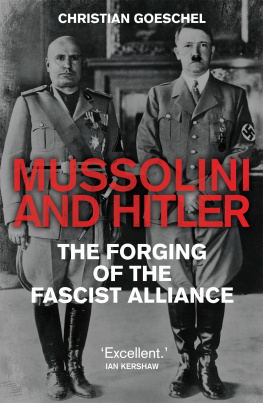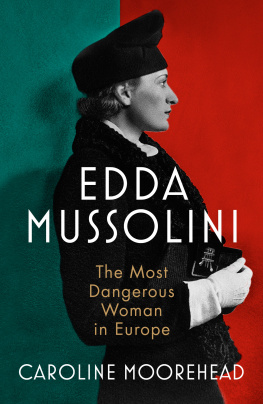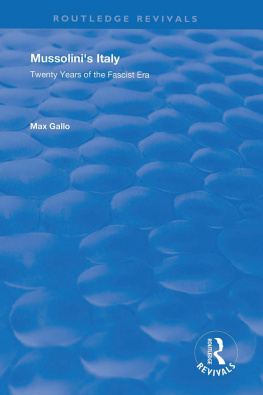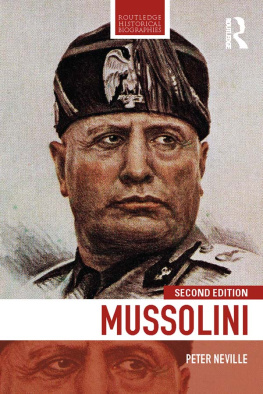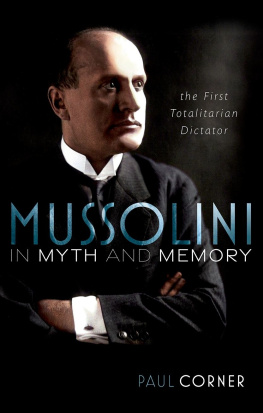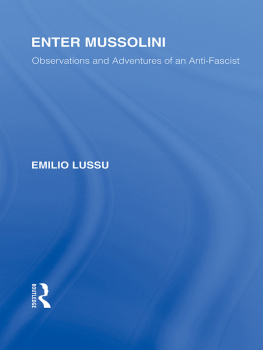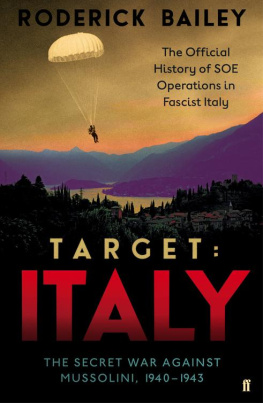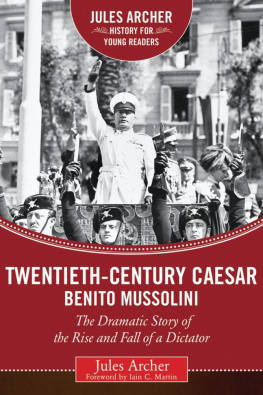MUSSOLINI AND HITLER

Copyright 2018 Christian Goeschel
All rights reserved. This book may not be reproduced in whole or in part, in any form (beyond that copying permitted by Sections 107 and 108 of the U.S. Copyright Law and except by reviewers for the public press), without written permission from the publishers.
For information about this and other Yale University Press publications, please contact:
U.S. Office:
Europe Office:
Set in Adobe Garamond Pro by IDSUK (DataConnection) Ltd
Printed in Great Britain by Gomer Press Ltd, Llandysul, Ceredigion, Wales
Library of Congress Control Number: 2018935621
ISBN 978-0-300-17883-8 (hbk)
A catalogue record for this book is available from the British Library.
10 9 8 7 6 5 4 3 2 1
CONTENTS
PLATES
ACKNOWLEDGEMENTS
Without the support of my colleagues, friends and family I would never have finished this book. To start with, I would like to thank the librarians and archivists in Italy (especially at the Biblioteca di storia moderna e contemporanea in Rome, the Biblioteca nazionale centrale in Florence, the library of the Deutsches Historisches Institut in Rome, the library of the European University Institute in Florence, the Istituto storico della resistenza in Toscana in Florence, the Archivio storico del Comune di Firenze, the Archivio storico capitolino in Rome, the Archivio centrale dello Stato in Rome, and the Archivio storico diplomatico del Ministero degli affari esteri in Rome), in Germany (especially at the Bundesarchiv in Koblenz, Freiburg and Berlin, the Politisches Archiv des Auswrtigen Amts in Berlin, the Bayerische Staatsbibliothek and the Institut fr Zeitgeschichte in Munich), in Britain (especially at the British Librarys Humanities Reading Room 2, the National Archives, the German Historical Institute in London and Manchester University Library) and Australia (especially at the ANU Chifley Library and the splendid Petherick Room of the National Library of Australia in Canberra) for supplying me with the material.
One of the main inspirations for this book was the work of the German historian Wolfgang Schieder, among the first scholars to examine in depth the relationship between Fascist Italy and Nazi Germany. His German monograph on Hitlers views on Mussolini appeared only after the completion of the present book. A paper at a workshop on the history of transnational fascism in May 2010 in London was my first foray into Italian history, and I must thank the audience for their encouragement. Richard Bosworth generously invited me to speak in Australia in September 2010. Ever since, histor-ians of modern Italy have kindly accepted me into their ranks, including Paul Corner, the late Christopher Duggan, John Foot, Paul Ginsborg, Stephen Gundle, David Laven and Lucy Riall. At various stages of my project, conversations with Giulia Albanese, Pam Ballinger, Martin Baumeister, Patrick Bernhard, Ralph Dobler, Bianca Gaudenzi, Lutz Klinkhammer, Andrea Mammone, Benjamin Martin, Alessandra Tarquini and especially with Oliver Janz were extremely instructive.
Conversations with Jan Rger, Sean Brady, Naoko Shimazu, Serafina Cuomo and my former students at Birkbeck College, where a Leverhulme Early Career Fellowship, although awarded for a different project, gave me the time to read and think, helped me get the project started, as did exchanges with Daniel H. Magilow, Dejan Djoki, Geoff Eley, Brendan Simms, Christopher Wheeler, Giuseppe Laterza and especially Sir Richard Evans. Kilian Bartikowski generously shared some documents with me. In Australia, I benefited enormously from conversations with my students and colleagues at the Australian National University, which funded two research trips to Europe, including Gemma Betros, Frank Bongiorno, Alex Cook, Tom Griffiths, Pat Jalland and Carolyn Strange. Elsewhere in the Antipodes, Andrew Bonnell, Aedeen Cremin, Hubertus Klink and Glenda Sluga supported my work. At Manchester I have enjoyed many fruitful conversations with students and colleagues, including Stuart Jones, Thomas Tunstall Allcock and Frank Mort of Manchesters Political Cultures group, Georg Christ and Alexia Yates.
I owe a particular debt to colleagues and students at the Department of History and Civilization at the European University Institute in Florence who have helped me advance my work, especially Lucy Riall, Pieter Judson, Marla Stone, Regina Grafe, Gabriel Piterberg, Dirk Moses, Gal Snchez Cano, Natasha Wheatley, Laura Lee Downs and Tara Zahra. A visiting fellowship at the same institution, hosted by Lucy Riall, in the spring of 2017 during my sabbatical semester at Manchester University gave me time to complete the book. I should also like to thank lecture and seminar audiences at the Australian National University, the Freiburg Institute for Advanced Studies, the University of Queensland, the University of Sydney, the University of Genoa, the University of Cambridge and the University of Western Australia for valuable suggestions.
Several friends and colleagues, including Hatsuki Aishima, Gemma Betros, Andrew Bonnell, Paul Corner, Moritz Fllmer, Sir Ian Kershaw, Molly Loberg, Mark Offord, Naoko Shimazu, Marla Stone and David Laven have commented on draft chapters. Sir Richard Evanss advice and encouragement was particularly generous and helpful. As I was finishing the book, discussions with Hannah Malone, Anirudha Dhanawade, Catherine Brice, Carmen Belmonte, Sir Ian Kershaw and, above all, David Laven, Dejan Djoki and Naoko Shimazu were most helpful. At Yale University Press, Heather McCallum, Rachael Lonsdale and Marika Lysandrou have been brilliant, supportive and patient. Jonathan Wadman ably copy-edited the manuscript, and Douglas Matthews compiled the index. I should also like to acknowledge the anonymous readers for making some valuable suggestions. Particularly special thanks are due to Georgina Capel and her team for their unflinching support of my project.
Earlier versions of some of the material used in chapters 1 and 3 have appeared as my preface to Renzo De Felice, Mussolini e Hitler: I rapporti segreti, 19221933, con documenti inediti, Bari/Rome, 2013, pp. vxxiii, and as my article Staging Friendship: Mussolini and Hitler in Germany in 1937, Historical Journal, 60 (2017), pp. 14972.
My final thanks go to my friends in Italy Elena Pezzini, Valentina Pezzini and Marcello Adam, Cristina Rognoni, Giancarlo Raddi and Katja Rosenhagen, Walter Baroni and Gabriella Petti, and Caterina Sinibaldi for their tremendous kindness and generosity, as well as to my parents, my brother and Francesco Filangeri. Without the support, encouragement and friendship of Lucy Riall, who read the entire manuscript, it is unlikely that I would have ventured into the field of Italian history.
The greatest thanks go to Hatsuki Aishima, who constantly reminds me of the joys of life.
Manchester, June 2017
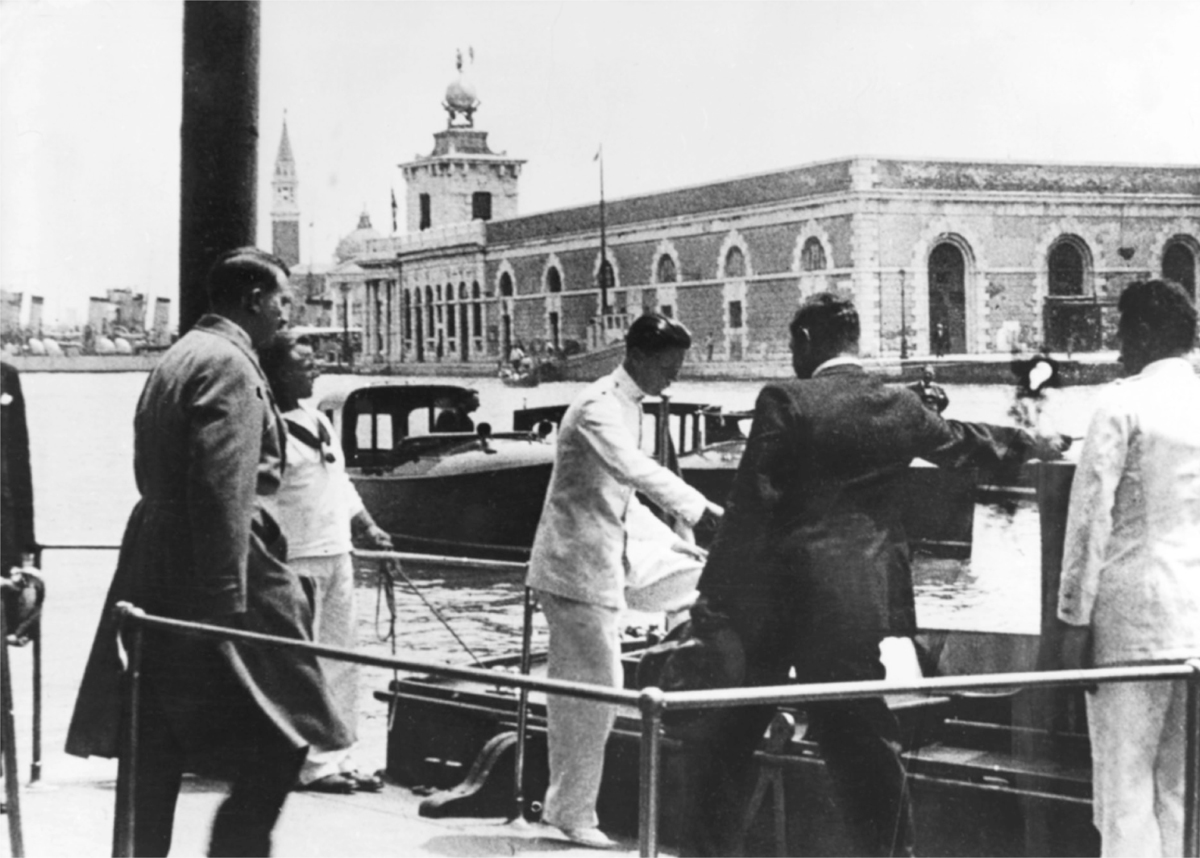
1. Hitler, dressed in a trench coat, awkwardly climbs into a boat on his way to meet Mussolini near Venice in June 1934. The Fhrers attire was later the subject of much ridicule, but, in reality, matters were more complex.
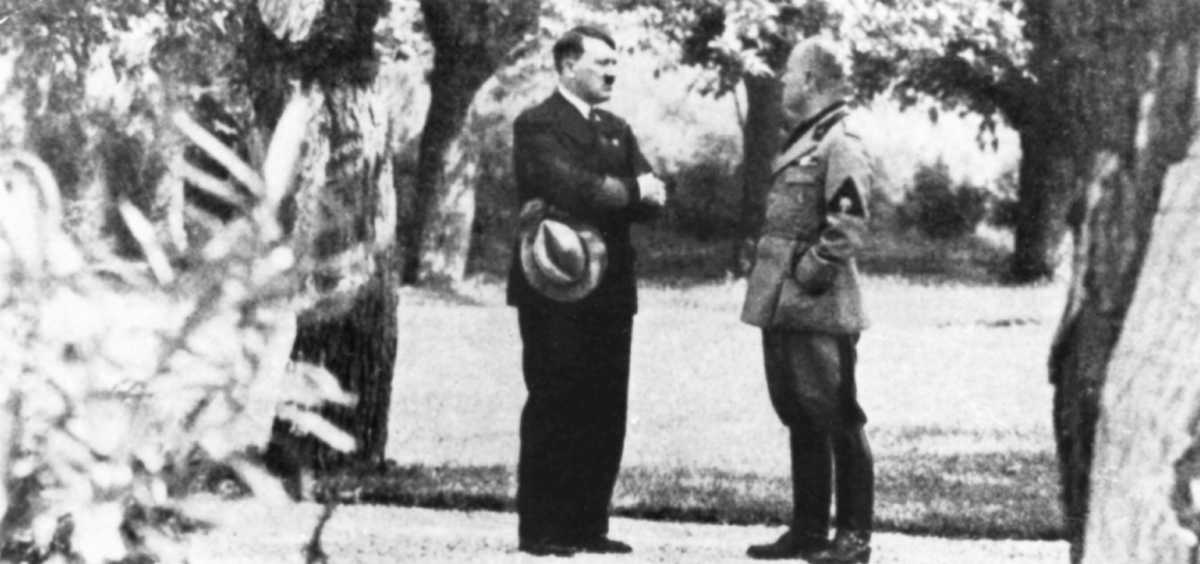
2. Mussolini and Hitler in animated conversation in the gardens of Villa Pisani in Stra. The leaders outfits give a good idea of their different standing in June 1934.
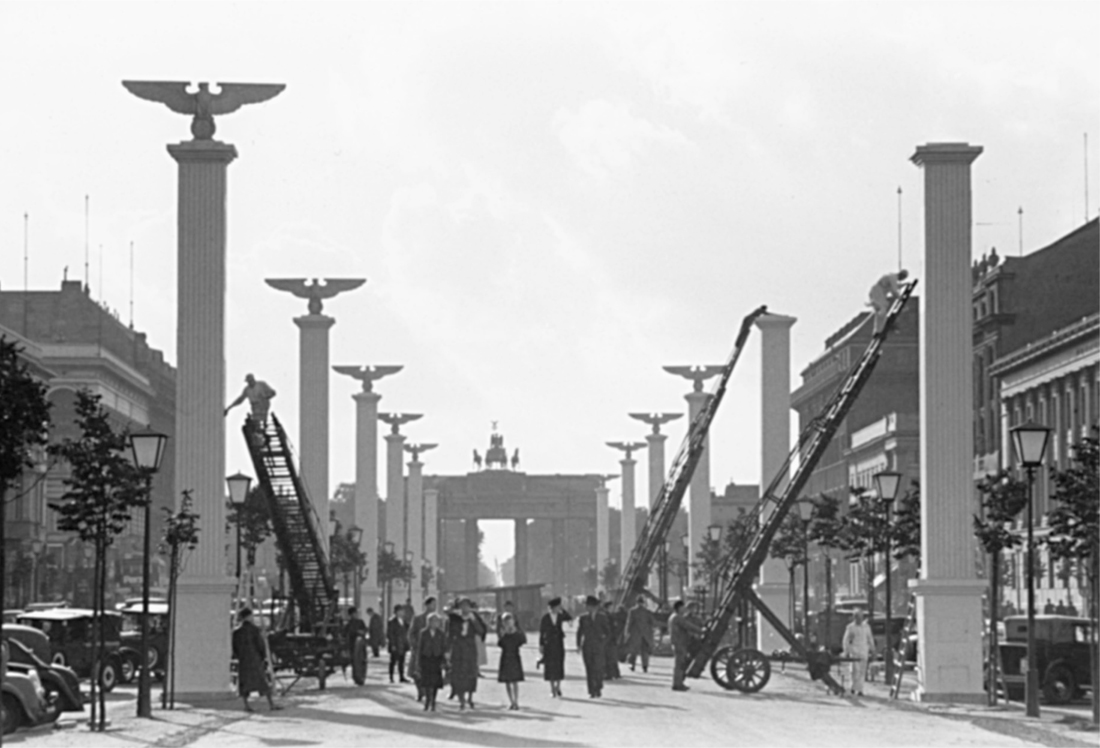
Next page
